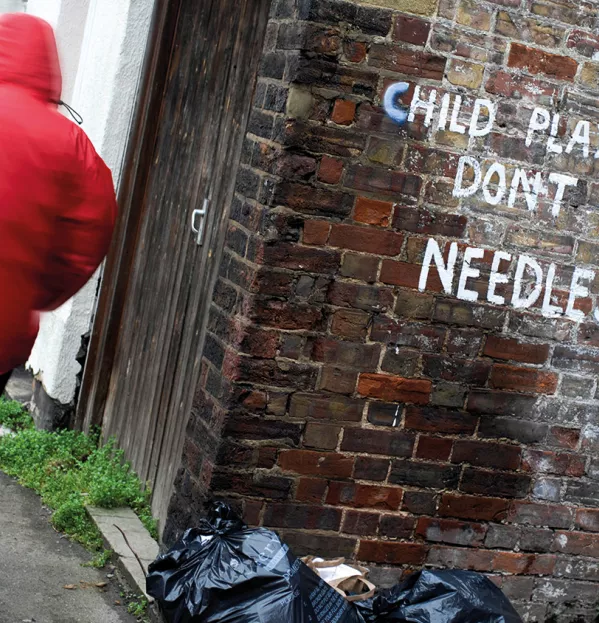‘It’s criminal to send vulnerable pupils here’

“There are gangs and drugs and sexual commerce and lots of that happening in Thanet. To send vulnerable children here is just criminal.”
Kate Greig, headteacher of King Ethelbert School, a secondary academy in Thanet, Kent, is concerned that “huge numbers” of children in care are being moved to her area from parts of London where there are foster care shortages.
Thanet is the 35th most deprived area out of 326 local authority districts in England but, as an area with relatively affordable housing and limited employment opportunities, it has a large number of foster carers.
Greig is being backed by Paul Luxmoore, the executive head of her school’s academy chain, the Kent-based Coastal Academies Trust. He is refusing to comply with any demands to accept children in care from outside his area unless education secretary Damian Hinds takes personal responsibility for their safety.
‘Challenging area’
Luxmoore has been warned by the Department for Education’s Education and Skills Funding Agency (ESFA) about the consequences of rejecting an in-year application sent on behalf of a looked-after child from another area.
He compares the social problems in areas in which his schools are based with those in Rochdale and Rotherham, where vulnerable girls were groomed for sex by gangs of men.
“Thanet has always been a challenging area and it’s becoming even more challenging, because of the growth of drug-related gangs,” he says.
Luxmoore says he has previously warned officials of the risks faced by children who move to his area. Now he has drawn a clear line in the sand.
“I said [to the ESFA] that I would only consider accepting a direction to accept out-of-county, looked-after children if that direction came from the secretary of state personally, so that he takes responsibility for sending the most vulnerable children to one of the most deprived parts of the country, in spite of our warnings of the dangers they face here,” he says.
Luxmoore says the ESFA has sent him two notices stating that it is “minded to direct” the trust to accept a child, and warning that refusing to do so would amount to breaking the terms of his funding agreement.
But he doubts whether officials would take it that far. “To close a school [on these grounds]…it would be politically interesting,” he muses.
Dragged into crime
The arguments from Greig and Luxmoore are repeated by heads in other deprived parts of England, who fear the impact of in-year applications for looked-after children whose safety they cannot guarantee.
Children in care who are forced to move to a school in a different part of the country may have been previously dragged into crime or have faced physical threats. So, the heads argue, the last thing they need is to move to a school in a new neighbourhood where they will face similar - or even worse - risks.
Taking this into account, could it be that the failure of looked-after children to get a school place is rooted in decisions about where they live, rather than schools’ decisions to reject them?
The Office of the Schools Adjudicator’s annual report, published earlier this month, touches on these concerns, noting that some local authorities believe that “not enough consideration” is given by other councils to educating children when selecting their foster placements.
“In the most concerning cases, I was told of children at risk of sexual exploitation being placed in areas where there were known child sexual exploitation risks,” the report says.

As well as Kent, other areas that are understood to receive particularly high numbers of looked-after children from elsewhere include parts of Staffordshire, Cambridgeshire, North Yorkshire and Lincolnshire.
There can be problems in the capital, too. A freedom of information response to Tes reveals that in Waltham Forest, north-east London, a foundation school rejected an application from a looked-after child last year on the grounds of “high levels of gang activity in their school”.
Alan Brookes, headteacher of Fulston Manor School in Sittingbourne, Kent, has written to the DfE on behalf of East Kent headteachers about their concerns that too many children in care are being moved to hotspots for sexual exploitation, drugs and gangs.
In a written response on 23 November last year, Robert Goodwill, then minister for children and families, said: “I recognise the pressure significant numbers of looked-after children placed from other local authorities can put on schools.” However, he added: “Care placement availability is…shaped by market and commissioning practices.”
Brookes does not think that this is good enough, and says affected schools need more resources for children who often have “very complex needs”.
“They’re often being brought into schools that are full or beyond capacity already,” he says. “They need additional staffing. They need support workers.”
‘Emergency’ placements
But Jane Pickthall, chair of the National Association of Virtual School Heads, which is responsible for overseeing the education of looked-after children, suggests this is an over-generalisation. “We need to get away from the idea that all looked-after children are a problem,” she says. “If we’re saying that a mainstream place is best for them, then they don’t need specialist provision.”
One of the Kent headteachers’ particular gripes is the use of “emergency” placements, which allow children to be placed in care more than 20 miles away for their own safety. The heads feel that these placements put schools under more pressure to accept pupils when the child might be put at risk. Greig says it is often unclear why the move is so urgent.
But challenging these school placements, given the children’s difficult backgrounds, can be tricky, she says.
“Everybody’s slightly nervous about speaking out in public. The worry is that people say, ‘You don’t care about vulnerable children,’ which really upsets all of us,” Greig says.
“All the heart strings are pulled by the local authorities - [saying] ‘This poor child, you’ve got to do something.’ I get that, but I couldn’t live with myself if we have a child who comes to Thanet and gets into trouble.”
Strained relationships
Unfortunately, these difficult conversations are happening at a time when, according to Pickthall , relationships between virtual school heads and headteachers are increasingly strained. “It’s becoming more of a battle with school heads. It’s becoming more adversarial,” she says.
She blames the increasing accountability pressures placed on schools, adding: “We can’t get away from the fact that one to two children can hugely impact on a school’s data.”
But Greig is adamant that this isn’t a case of schools trying to protect their performance data, and that the schools’ concerns centre on pupil safety.
“The reason we do [the job of a headteacher] is because we love our children and care about them,” she says. “Somebody’s got to say, ‘We can’t go on like this.’”
You need a Tes subscription to read this article
Subscribe now to read this article and get other subscriber-only content:
- Unlimited access to all Tes magazine content
- Exclusive subscriber-only stories
- Award-winning email newsletters
Already a subscriber? Log in
You need a subscription to read this article
Subscribe now to read this article and get other subscriber-only content, including:
- Unlimited access to all Tes magazine content
- Exclusive subscriber-only stories
- Award-winning email newsletters